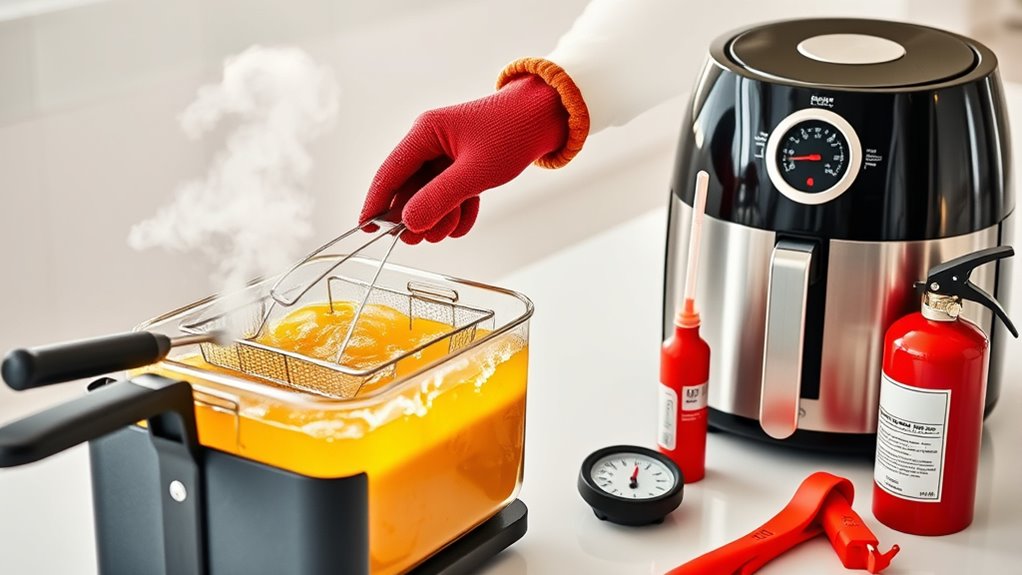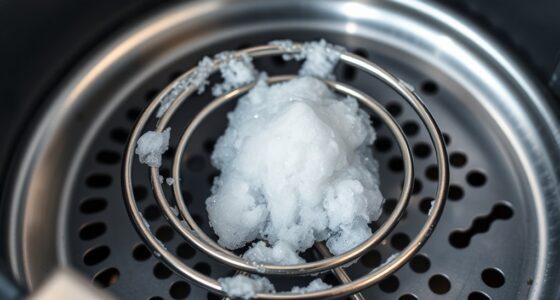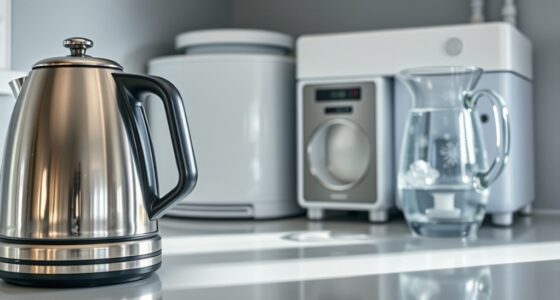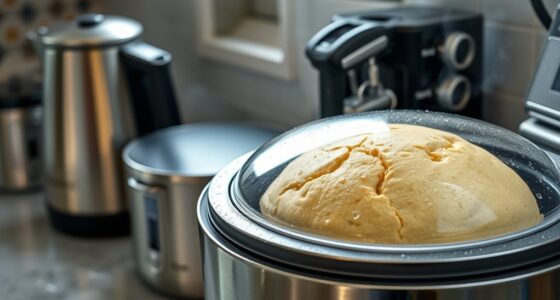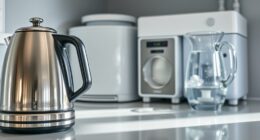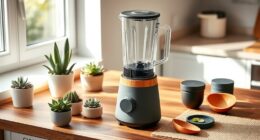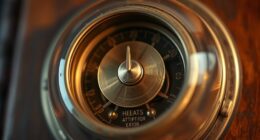To stay safe while using deep fryers and air fryers, handle food and oil carefully, adding ingredients slowly to prevent splashes. Always place your appliance on a stable, heat-resistant surface away from walls and children, and keep plenty of space for airflow. Wear protective clothing like aprons and long sleeves, and never move a hot fryer. Turn off, unplug, and allow it to cool before cleaning or relocating. Continuing will help you master more safety tips for confident frying.
Key Takeaways
- Always place fryers on stable, heat-resistant surfaces away from walls and clutter.
- Avoid overfilling with oil or food to prevent splatters and potential overflow.
- Handle food gently using tools like baskets or slotted spoons to minimize hot oil splashes.
- Turn off and unplug the fryer before cleaning or moving, and allow it to cool completely first.
- Wear protective clothing such as aprons and long sleeves during use to guard against hot oil splatters.
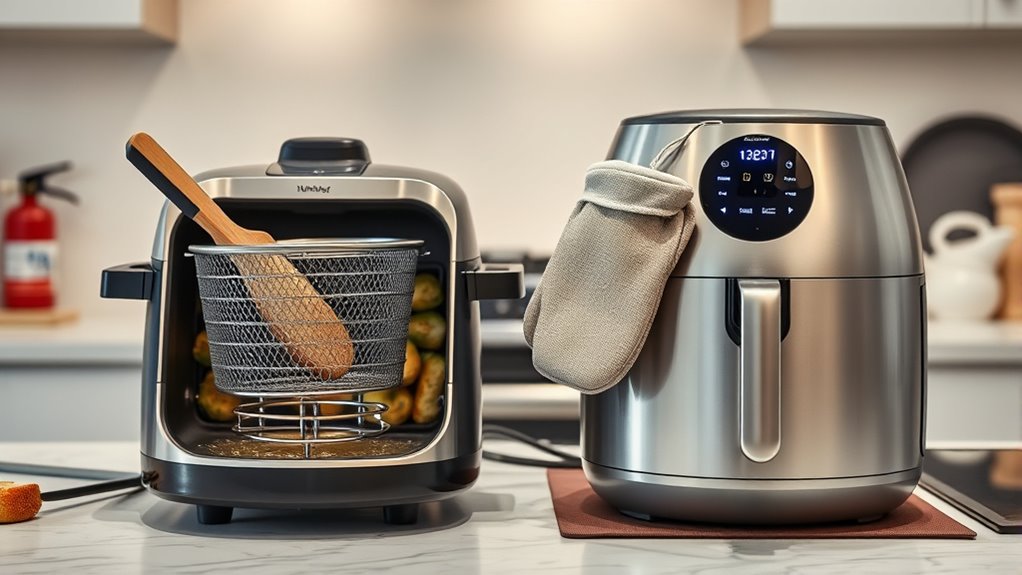
Using deep fryers and air fryers can make cooking easier and more delicious, but safety should always come first. One of the most common hazards when operating these appliances is oil splatters. Hot oil can cause severe burns if it lands on your skin, so it’s essential to handle the fryer carefully. To minimize splatters, guarantee you don’t overfill the fryer with oil—leave enough space for the food to submerge without overflowing. When adding food to hot oil, do so gently and slowly. Using a slotted spoon or basket helps keep your hands away from splattering oil and provides better control. Also, keep a close eye on the fryer during operation; sudden movements or overcrowding can trigger dangerous splashes. Remember, wearing long sleeves and an apron adds an extra layer of protection against hot oil splatters.
Equally important is the proper placement of your appliance. Always place your fryer on a stable, flat surface away from the edge of the counter to prevent accidental knocks or tip-overs. Keep it out of reach of children and pets, as curiosity can lead to accidents. Guarantee the area around the fryer is clear of clutter, especially combustible items like paper towels, dishcloths, or paper packaging. Good appliance placement also involves positioning the fryer away from water sources, sinks, or other appliances that could cause electrical hazards. If you’re using an air fryer, make sure it is positioned in a well-ventilated area with enough space around it for proper airflow. For deep fryers, check that the cord isn’t stretched across walkways, reducing the risk of tripping or pulling the appliance off the counter. Proper placement can also help maintain the optimal temperature and performance of your home appliance over time.
In addition, always follow the manufacturer’s instructions regarding placement and use. Many models recommend placing the appliance on heat-resistant surfaces and avoiding direct contact with walls or cabinets, which could overheat or catch fire. When you’re done cooking, turn off the appliance and unplug it before cleaning or moving it. Proper appliance placement not only enhances safety but also prolongs the lifespan of your fryer. Never attempt to move a hot fryer, and give it time to cool down completely before cleaning. By paying close attention to where and how you position your fryer, you reduce the risk of accidents and guarantee a safer, more enjoyable cooking experience.
Frequently Asked Questions
Can I Leave My Fryer Unattended While in Use?
No, you shouldn’t leave your fryer unattended while in use. Supervision guidelines emphasize staying nearby to monitor for any signs of trouble, like smoke or splattering. Always keep an eye on the temperature and oil levels to prevent accidents. Additionally, be prepared for emergencies by having a fire extinguisher rated for kitchen fires close by. Staying alert guarantees your safety and helps avoid potential hazards associated with frying.
What Should I Do if the Oil Catches Fire?
If the oil catches fire, stay calm and don’t try to move the fryer. Turn off the heat immediately. Use a fire extinguisher rated for grease fires, like a Class K or multipurpose extinguisher, and aim at the base of the fire. Never use water, as it can cause the fire to spread. To prevent oil fires, never overfill your fryer and always stay nearby while cooking.
Are There Specific Foods I Should Avoid Frying in Air Fryers?
Think of your air fryer as a delicate dance partner; not all foods move well together. Avoid frying overly wet foods or items with high sugar content, like wet batter or donuts, as they can cause smoking or messes. Check food compatibility and allergy concerns first—some foods may pose risks or cause cross-contamination. Sticking to recommended items guarantees a safe, smooth performance and delicious results every time.
How Often Should I Clean and Replace Fryer Parts?
You should clean your fryer after every use to ensure fryer maintenance stays ideal. Regularly check and replace parts like the basket and oil filter as needed to prevent buildup and ensure safety. When disposing of used oil, do so responsibly by allowing it to cool then pouring it into a sealed container for proper oil disposal. Keeping up with these steps prolongs your fryer’s lifespan and maintains safe, efficient operation.
Is It Safe to Reuse Cooking Oil Multiple Times?
Did you know that reused cooking oil can degrade by up to 20% after just a few uses? It’s generally safe to reuse oil if it hasn’t broken down, but watch for signs of oil degradation like darkening, smoking, or a rancid smell. Proper oil recycling helps maintain quality and safety. Always strain and store oil properly, and avoid reusing it beyond its prime to prevent health risks.
Conclusion
So, next time you enthusiastically toss in that oil or air-fried snack, remember safety isn’t just a suggestion—it’s your best friend. Because nothing says “crispy perfection” like a kitchen mishap that leaves you cleaning up more than just greasy fingers. Keep your eyes on the fryer, stay cautious, and maybe, just maybe, avoid turning your cozy kitchen into a fiery disaster zone. After all, a little care goes a long way—especially when crispy dreams could turn into smoky nightmares.
